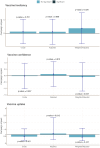A pre-post evaluation study of a social media-based COVID-19 communication campaign to improve attitudes and behaviors toward COVID-19 vaccination in Tanzania
- PMID: 38709712
- PMCID: PMC11073716
- DOI: 10.1371/journal.pone.0300206
A pre-post evaluation study of a social media-based COVID-19 communication campaign to improve attitudes and behaviors toward COVID-19 vaccination in Tanzania
Abstract
In Tanzania, the One by One: Target COVID-19 campaign was launched nationally in July 2022 to address the prevalent vaccine hesitancy and lack of confidence in COVID-19 vaccines. The campaign mobilized social media influencers and viral content with the ultimate goal of increasing COVID-19 vaccine uptake in the country. The objective of this study was to empirically assess the impact of the campaign on three outcomes: vaccine confidence, vaccine hesitancy, and vaccination status. Using programmatic data collected through an online survey before and after the campaign, we conducted a difference-in-difference (DiD) analysis and performed a crude, adjusted, and propensity score-matched analysis for each study outcome. Lastly, to observe whether there was any differential impact of the campaign across age groups, we repeated the analyses on age-stratified subgroups. Data included 5,804 survey responses, with 3,442 and 2,362 responses collected before and after the campaign, respectively. Although there was only weak evidence of increased COVID-19 vaccine confidence in the campaign-exposed group compared to the control group across all age groups, we observed a differential impact among different age groups. While no significant change was observed among young adults aged 18-24 years, the campaign exposure led to a statistically significant increase in vaccine confidence (weighted/adjusted DiD coefficient = 0.76; 95% CI: 0.06, 1.5; p-value = 0.034) and vaccination uptake (weighted/adjusted DiD coefficient = 1.69.; 95% CI: 1.02, 2.81; p-value = 0.023) among young adults aged 25-34 years. Among adults aged 35 years and above, the campaign exposure led to a significant decrease in vaccine hesitancy (weighted/adjusted DiD coefficient = -15; 95% CI: -21, -8.3; p-value<0.001). The social media campaign successfully improved vaccine hesitancy, confidence, and uptake in the Tanzanian population, albeit to varying degrees across age groups. Our study provides valuable insights for the planning and evaluation of similar social media communication campaigns aiming to bolster vaccination efforts.
Copyright: © 2024 Kim et al. This is an open access article distributed under the terms of the Creative Commons Attribution License, which permits unrestricted use, distribution, and reproduction in any medium, provided the original author and source are credited.
Conflict of interest statement
The authors have declared that no competing interests exist.
Figures





Similar articles
-
Changes in general and COVID-19 vaccine hesitancy among U.S. adults from 2021 to 2022.Ann Med. 2024 Dec;56(1):2357230. doi: 10.1080/07853890.2024.2357230. Epub 2024 May 30. Ann Med. 2024. PMID: 38813804 Free PMC article.
-
Relationship between parental acceptance of the COVID-19 vaccine and attitudes towards measles vaccination for children: A cross-sectional study.Vaccine. 2024 Oct 24;42(24):126068. doi: 10.1016/j.vaccine.2024.06.035. Epub 2024 Jun 16. Vaccine. 2024. PMID: 38880690
-
COVID-19 vaccine hesitancy, trust, and communication in Sarlahi District, Nepal.Vaccine. 2024 Nov 14;42 Suppl 5:126034. doi: 10.1016/j.vaccine.2024.06.002. Epub 2024 Jun 10. Vaccine. 2024. PMID: 38862309
-
Understanding the COVID-19 vaccine uptake, acceptance, and hesitancy in Ethiopia and Tanzania: a scoping review.Front Public Health. 2024 Nov 11;12:1422673. doi: 10.3389/fpubh.2024.1422673. eCollection 2024. Front Public Health. 2024. PMID: 39588164 Free PMC article.
-
The Worrying Phenomenon of COVID-19 Vaccine Hesitancy and Its Negative Impact on Pandemic Control Efforts: Common Themes that Emerged in the Middle East and North Africa (MENA) Region.Adv Exp Med Biol. 2024;1457:299-322. doi: 10.1007/978-3-031-61939-7_17. Adv Exp Med Biol. 2024. PMID: 39283434 Review.
Cited by
-
Enhancing COVID-19 Vaccination Awareness and Uptake in the Post-PHEIC Era: A Narrative Review of Physician-Level and System-Level Strategies.Vaccines (Basel). 2024 Sep 11;12(9):1038. doi: 10.3390/vaccines12091038. Vaccines (Basel). 2024. PMID: 39340068 Free PMC article. Review.
References
-
- WHO Africa Regional Office. Coronavirus (COVID-19) 2022 [afro.who.int/health-topics/coronavirus-covid-19].
-
- Africa CDC. COVID-19 Vaccination 2022 [https://africacdc.org/covid-19-vaccination/].
-
- The New York Times. Tracking Coronavirus Vaccinations Around the World 2022 [https://www.nytimes.com/interactive/2021/world/covid-vaccinations-tracke...].
-
- Ahinkorah BO, Ameyaw EK, Hagan JE, Seidu A-A, Schack T. Rising Above Misinformation or Fake News in Africa: Another Strategy to Control COVID-19 Spread. Frontiers in Communication. 2020;5.
Publication types
MeSH terms
Substances
LinkOut - more resources
Full Text Sources
Medical

